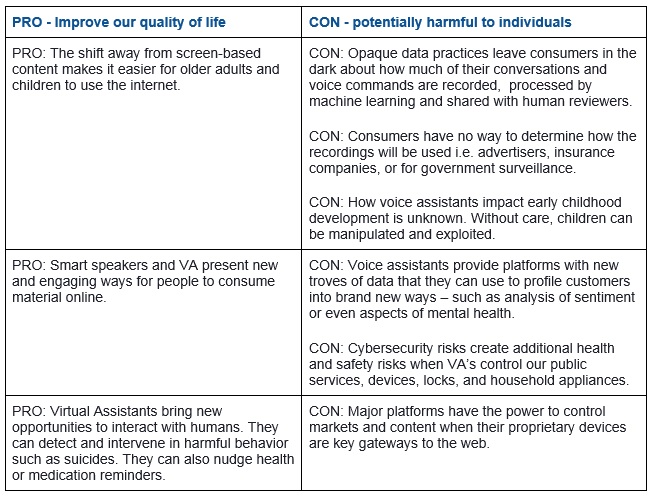“10 Minutes, I’ll Give You The Truth About Smart Speaker and Virtual Assistants”.
Marsali Hancock of the EP3 Foundation discusses voice command virtual assistants.
What You Need to Know
“Hey, Google,” and other voice-commanded virtual assistants (VA) are changing how humans connect to machines at a head-spinning, dizzying pace. They are the new interface to the Web. Virtual assistants consumers’ access to the digital world, and sees the private data of billions of people across all different services. The 2019 Horizon Report stated that the widespread adoption of VA technology is expected within four to five years.
Consider the Pros and Cons to Voice Commanded Virtual Assistants
When people can choose and control how their data is used, then VAs will safely improve health, wellness, and support global economies. Without it, the linguistic web will limit the number of languages and control internet markets.
Currently, only a few, wealthy and data-rich companies have enough resources to support and develop VA platforms. By default, their platforms are set to dominate and control the languages spoken and our internet experience. Working together, we can reduce the risk of exploitation and control of proprietary systems. Open-world collaboration is necessary if we want voice-controlled assistants in every domain and in every human language. With support from industry, academic, and policy leaders, we can democratise AI, making voice-commanded virtual assistants able to benefit all.
The Very Big Problem
Roughly 150 to 200 languages are spoken by more than a million people. However, almost all countries and businesses lack the resources to develop voice virtual assistants. It is very expensive, too expensive for all but a few, mega-size companies. Even if money was available, the lack of access to enough user data, and highly trained data scientists make it impossible to compete. For example, Amazon, alone, has more than 10,000 employees working on its VA Alexa and Echo, the devices it powers. Today, only the wealthiest companies and countries have enough resources. Not by design but by default, these organisations are set to become an oligopoly, unless there is a successful open alternative.
Why We Should Care
The virtual assistant will transform our internet experience by giving us a unique and integrated language-based interface to all of our digital assets, which are currently siloed in different services. As it collects and learns detailed information across all users, it will predict and influence our behaviours, such as reminding us to take our medication. By gathering details on business decisions and outcomes, assistants will monitor and optimise business logic across professions. It is likely that a platform monopoly or duopoly will emerge for the virtual assistant.
Monopolies and Oligopolies Control Markets and Restrict Language
Without industry and policy leadership, large-scale, companies are set to dominate and control. Small and midsize businesses, core to the economy, will lose market share, and we will continue to lose control over our personal information. Additionally, a small group of corporate executives will control what spoken languages are supported and what we find and do online.
Stanford Open Virtual Assistant Lab
To disrupt the current trend towards monopolies, Prof. Monica Lam at Stanford University established Stanford Open Virtual Assistant Lab (OVAL). The goal is to democratise AI and create an open, non-proprietary language-based web. Open, collaborative research puts open-source linguistic technology in the hands of all businesses. All skills, or linguistic user interfaces, should be made available to any virtual assistant. OVAL successfully launched Almond, a fully-working prototype assistant, that protects privacy by running on users’ personal devices. It gives users the ability to control how their data is shared.
All skills, or linguistic interfaces, should be made available to any virtual assistant
OVAL brings companies and policy leaders together to create an industrial ecosystem that protects consumer privacy and promotes open competition. We invite policy, academic, and industry leaders to collaborate and support Open Virtual Lab (OVAL) with human, technical, and financial resources. OVAL’s successful prototypes let companies develop with their own language interfaces so they can be independent of dominant assistant platforms.
Participate and support the Open Virtual Assistant Lab to ensure every country, and language can be included in the linguistic web. Learn more about OVAL’s open repository and how you can contribute. https://almond.stanford.edu/

About the EP3 Foundation
EP3 Foundation is an initiative of the Internet Safety Project, a 501(c)(3) non-profit organisation. Our mission is to improve health, wellness, and economic opportunities by empowering people with data privacy, control, and personalisation. To learn more, please contact Marsali Hancock at Mhancock@ep3foundation.org.








